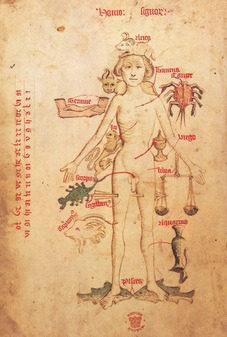 Astrology is in the news today with MP David Tredinnick claiming that astrology could have “a role to play in healthcare”. He said that, along with complementary medicine, astrology "could take pressure off NHS doctors". This idea seems unlikely to me. I can't see any scientific basis for astrology nor the conclusions drawn from analysis of your birth sign. In Elizabethan England astrology was very popular. Your physician was as likely to cast your horoscope in order to assess and treat your disease. Astrology was connected with the four humours and the concept that the body was maintained in a state of health by balance of these substances which could be affected by outside influences. At that time it was not possible to explain the workings of the human body by way of scientific disciplines so other explanations often based on bad airs, magic, astrology and religion were used. For those interested there is a very informative book on this topic called Magic and Medicine in Elizabethan London. The astrologer physician Simon Forman kept a series of casebooks which are still held at the Bodleian library. These casebooks have been studied by Lauren Kassell and her team in Oxford and they have digitised them on the web. They make a fantastic resource for scholars of medical history are of little practical relevance for practicing physician today. It would be ludicrous to think that your birth sign could have any significant effect on your risk of disease or indeed your response to treatment; Wouldn't it? Thinking about this today I remembered an interesting analysis of the ISIS-2 clinical trial. In this study the effect of Aspirin was compared to that of placebo in patients with acute myocardial infarction. Overall the trial was positive showing a strong benefit. The authors went on to show that aspirin was, however, ineffective in patients born under the star signs of Libra and Gemini (150 deaths on aspirin vs 147 on placebo), but was beneficial in the remainder (654 deaths on aspirin vs 869 on placebo). As the authors said "most people laughed when they were shown the results" but if a more plausible separation of data is presented (e.g. men versus women, or African Americans versus Caucasians) they are more likely to believe them even though they still reflect the analysis of subgroups. But it doesn't stop with drug therapy. A study of endarterectomy for severe carotid stenosis showed a remarkable trend in benefit (p<0·0000001), highest in patients born in May or June and falling smoothly to possible harm in March and April. Was this the influence of birth on outcome of a surgical procedure - I don't think so. If your interested in more of these subgroup anomalies they are well described in this review by Peter Sleight. Before we start to claim this is evidence for astrological influences at the time of our birth we need to remember that these results were based on subgroup analyses which are unreliable. The power calculation for a clinical trial is determined for the primary endpoint and statistical analysis of secondary endpoints or subgroups may be interestingly but misleading. Perhaps the best place for astrology is in the newspapers - a light relief between the cartoons and the TV guide.
0 Comments
Your comment will be posted after it is approved.
Leave a Reply. |
Dr Richard BogleThe opinions expressed in this blog are strictly those of the author and should not be construed as the opinion or policy of my employers nor recommendations for your care or anyone else's. Always seek professional guidance instead. Archives
August 2023
Categories
All
|
 RSS Feed
RSS Feed

